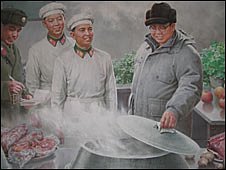There are more than 100 oils, water colors and traditional Korean ink paintings, dating from the 1960s to the present day. The life depicted there are pure "joy". Apparently, Northern Korean live in a land not dissimilar to the wonderland created by Thomas Kinkade.
These so called are are as naive as sinister. Being charitable, we can call it communism kitsch.

Noon time, by Yang Myong Ryong, 1963

Kim Jong Il, the supreme commander of the KPA, deeply concerned over the soldiers' diet, by Ri Chol, 2000
I happen to be reading Milan Kundera's The Unbearable Lightness of Being. I actually am reading precisely these few paragraphs now:
The feeling included by kitsch must be a kind the multitudes can share. Kitsch may not, therefore, depend on an unusual situation; it must derive from the basic images people have engraved in their memories: the ungrateful daughter, the neglected father, children running on the grass, the motherland betrayed, first love.People should realized that kitsch is not the monopoly of certified totalitarian countries such as North Korea. Texas can proudly join the rank.
Kitsch causes two tears to flow in quick succession. The first tear says: How nice to see children running on the grass!
The second tear says: How nice to be moved, together with all mankind, by children running on the grass!
It is the second tear that makes kitsch kitsch.
The brotherhood of man on earth will be possible only on a base of kitsch.
And no one knows this better than politicians. Whenever a camera is in the offing, they immediately run to the nearest child, lift it in the air, kiss it on the cheek. Kitsch is the aesthetic ideal of all politicians and all political parties and movements.
Those of us who live in a society where various political tendencies exist side by side and competing influences cancel or limit one another can manage more or less to escape the kitsch inquisition: the individual can preserve his individuality; the artist can create unusual works. But whenever a single political movement corners power, we find ourselves in the realm of totalitarian kitsch.
When I say "totalitarian," what I mean is that everything that infringes on kitsch must be banished for life: every display of individualism (because a deviation from the collective is a spit in the eye of the smiling brotherhood); every doubt (because anyone who starts doubting details will end by doubting life itself); all irony (because in the realm of kitsch everything must be taken quite seriously); and the mother who abandons her family or the man who prefers men to women, thereby calling into question the holy decree "Be fruitful and multiply."
In this light, we can regard the gulag as a septic tank used by totalitarian kitsch to dispose of its refuse.






No comments:
Post a Comment